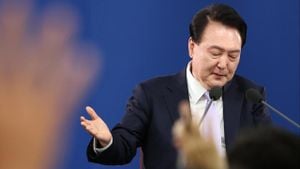South Korea's recent political turmoil has gripped the attention of not just its citizens but the entire world. A shocking declaration of martial law by President Yoon Suk-yeol has stirred controversy, necessitating a rapid retraction just days later. This dramatic sequence of events unfolded amid nationwide protests, igniting long-standing debates on civil rights versus national security.
Initially, with mounting unrest fueled by public dissatisfaction over the government's handling of the economy, Yoon’s administration found itself cornered. Facing significant protests—spurred by soaring inflation, stagnant wages, and rising living costs—the president decided to declare martial law, which he justified as necessary to restore order. His announcement was met with outrage; many citizens saw it as the government overreaching its power and infringing upon their basic rights.
Critics immediately pointed to the potential for violence and suppression of dissent. The declaration raised eyebrows not just at home but abroad, leading to fears of South Korea sliding back to the authoritarian times of the past. Activists and human rights organizations condemned the move, calling it a dangerous precedent reminiscent of previous oppressive regimes. Social media platforms buzzed with outcries against the declaration, echoing through every corner of the nation.
With the wave of public backlash growing stronger, Yoon's administration scrambled to backpedal. Only three days after the martial law declaration, the president withdrew it, stating, "The situation is under control, and we will prioritize dialogue with our citizens." This retraction marked yet another twist in the quickly changing political narrative and left many questioning the government's capacity to manage the mounting challenges facing the nation without resorting to extreme measures.
But what exactly drove Yoon to such drastic measures? Analysts trace this back to several interlocking crises brewing beneath the surface. The economy, once touted for its resilience, has faced staggering challenges. Disruptions caused by COVID-19, coupled with global supply chain issues, have deeply affected the South Korean populace’s economic stability. Wage stagnation, high youth unemployment, and inflation rising at rates not seen for decades have contributed to the unrest.
Meanwhile, this situation reflects broader sentiments within South Korea, illustrating political divisions and growing discontent among the populace. The situation pits younger generations—wary of governance and eager to embrace new political narratives—against the older, more traditional segments of society, who have typically supported more conservative stances. Activism among youth has surged, with individuals taking to the streets demanding both economic reform and greater political freedoms.
Beyond the internal fractures, South Korea's geopolitical position adds another layer of complexity. The specter of North Korea's aggressiveness, coupled with the U.S. and China’s shifting relations, raises the stakes for Yoon's government. Many citizens grapple with how their country can effectively navigate these tensions without compromising on democracy and personal rights.
Political analysts speculate on how Yoon will navigate this storm. The martial law flare-up might be a wake-up call for leaders about the necessity for proactive, meaningful solutions to pressing issues. Engaging with dissenting voices and establishing open dialogues seem more imperative than ever, and moving forward, the government will need to tread carefully. Restoring faith within the electorate is not just about policy but also about transparency and accountability.
While Yoon's administration has formally backed away from martial law, the ramifications of such decisions linger. Citizens are left reflecting on their trust in government actions and measures taken to assure their safety and well-being. This incident has written another chapter in South Korea's political saga, wherein the echoes of past authoritarianism are juxtaposed against the hope for democratic vigor.
Civil rights advocates are now united more than ever, ready to hold the government accountable, ensuring the watchful eye of the people stays vigilant against power abuses. South Korea stands at cross roads—its next moves could define its democratic integrity for generations to come.



